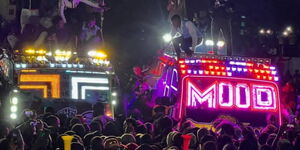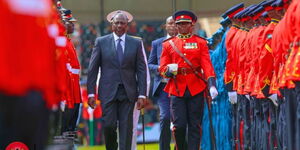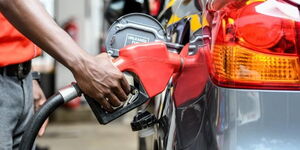UPDATE Thursday, July 2: Tourism CS Najib Balala, on Thursday, July 2, announced the reduction of entry fees to all Kenya Wildlife Service (KWS) game parks and reserves by up to 50%
The new changes will apply for all categories of tourists (local, residents and international) effective July 1, 2020, for one year. KWS also gave a one-year moratorium to lodge owners in its parks and reserves, for rent payment starting July 1, 2020, to June 30, 2021.
"In the new changes, residents and citizens will now enjoy the same rates. Park entry fees for domestic tourists (citizens and residents) in Premium Parks like Nairobi National park, Amboseli, Lake Nakuru and Tsavo East and West have gone down by 47% pegging the drop to gazetted conservation fees 2019 which were to take effect on July 1, 2020," reads a part of CS Balala's statement.
The CS further announced a 50% discount on filming fees for both local and international producers filming in parks and reserves and once again asked them to utilise the window to grow their businesses as well as market Kenya.
Kenya's National Parks around the country are currently open, a move that excited many stir-crazy citizens who have been battling the various mental issues that come with being confined to their homes, after the Covid-19 pandemic hit Kenya's lush plains in March 2020.
Speaking to Kenyans.co.ke, the Kenya Wildlife Service (KWS) Communications Director Paul Jinaro, affirmed that all the country's parks were open, but under a strict set of guidelines to ensure the health and safety of all visitors.
Knowing the various dangers posed by incoming crowds and the need to keep everyone safe, KWS laid out various measures and requirements necessary for one to access their various protected areas, within the designated time.
The outdoors is a great way to break out of quarantine, but with so many people having the same idea, it’s important to understand that the virus, and the influx of visitors, will impact each National Park differently.
Here’s what you need to know about visiting a National Park right now:
In keeping with the government directives on how to curb the transmission of the coronavirus, Kenya Wildlife Service has adopted the following measures:
1. Hours of operation have been adjusted. Entry will now be from 6:00 a.m. and exits 6:00 p.m. to comply with curfew rules.
2. All visitors to KWS facilities should observe mandatory hand-washing/sanitizing before entry.
3. All visitors undergo temperature checks at the main entrance.
4. A minimum of two (2) rangers at each picnic site to enforce the six-foot distance social distancing rule for those using restrooms.
5. Mandatory wearing of face masks while on KWS premises.
6. Visitors on game drives are not allowed to come out of vehicles at picnic sites, campsites and viewing points unless they are visiting restrooms.
"If you choose to visit a national park, please ensure that you follow national public health guidelines to prevent the spread of coronavirus. The decisions we make collectively will determine the direction that this outbreak will follow," reads an excerpt from a statement by the KWS.
With that in mind, here are 8 outdoor places you can visit and indulge in a host of activities during the pandemic.
Karura Forest
The Karura Forest Reserve is an urban upland forest on the outskirts of Nairobi, the capital of Kenya. This remarkable geographical location and natural resource is one of the largest gazetted forests in the world fully within city limits.
It covers an area of about 1,000 ha (2,500 ac) and today is a shining example of how country-based corporate social responsibility and individual philanthropy can serve to secure and protect a country's natural resources.
The forest offers eco-friendly opportunities for Kenyans and visitors to enjoy a leafy green respite from the hustle and bustle of the city to walk, to jog, or simply to sit quietly and experience the serenity of nature in all its diversity.
This is an excellent place to go if you want to hike in nature for the day. It's easy to forget that you are anywhere near Nairobi.
Visitors to Karura Forest can now hire a sturdy multi-speed trail bike to use on designated forest trails. Charges: Ksh500 for two hours extendable.
Forest Entrance Fees for Adults: Ksh100, Ksh200 & Ksh600 for Citizens, Residents and Non-Residents respectively. Children Entrance Fees: Ksh50, Ksh100 and Ksh300 for Citizens, Residents and Non-Residents respectively.
Nairobi National Park
“The World’s only Wildlife Capital” - A short drive out of Nairobi’s CBD is the Nairobi National Park.
Wide-open grass plains and backdrop of the city scrapers, scattered acacia bush play host to a wide variety of wildlife including the endangered black rhino, lions, leopards, cheetahs, hyenas, buffaloes, giraffes and diverse birdlife with over 400 species recorded.
The accepted modes of payment include MPESA, VISA Card, Direct Deposits to KWS Bank Accounts at any gate.
Entrance Fees: Ksh430, Ksh1,030 & USD 43 for Citizens, Residents and Non-Residents respectively. Children Entrance Fees: Ksh215, Ksh515 and USD 22 for Citizens, Residents and Non-Residents respectively.
Nairobi Orphanage & Nairobi Safari Walk
With its raised wooden boardwalk that allows for uninterrupted views of the animals, the Safari Walk is a show case for Kenya’s Parks and Reserves, allowing visitors to discover what they can expect to see across the country.
Visitors can see a sample of the country’s rich animal life including the rare bongo, white rhino and albino zebra as well as big cats, antelopes and primates. It is also home to some 150 species of local trees.
Entrance Fees: Ksh215, Ksh300 & USD 22 for Citizens, Residents and Non-Residents respectively. Children Entrance Fees: Ksh125, Ksh170 and USD 13 for Citizens, Residents and Non-Residents respectively.
Giraffe Manor
Giraffe Manor is an exclusive boutique hotel, owned by The Safari Collection. Often referred to as one of the most Instagrammed properties in the world, Giraffe Manor is set in 12 acres of private land within 140 acres of indigenous forest in the Lang'ata suburb of Nairobi.
The historic manor house has extraordinary appeal, that dates back to the 1930s when visitors first flocked to East Africa to enjoy safaris.
With its stately façade, elegant interior, verdant green gardens, sunny terraces and delightful courtyards, guests often remark that it’s like walking into the film Out of Africa: indeed, one of its twelve rooms is named after the author Karen Blixen.
One of the most fascinating things about Giraffe Manor is its resident herd of Rothschild’s giraffes who may visit morning and evening, poking their long necks into the windows in the hope of a treat, before retreating to their forest sanctuary.
Hell's Gate National Park
If the cessation of movement order issued by President Uhuru Kenyatta to combat the spread of Covid-19 restricted your movement to Kenya's vast Rift Valley region, worry not as there's plenty to do to keep your mind fresh.
Top of the list is the Hell's Gate National Park in Naivasha where you can literally take a walk in the wild side.
Named for the intense geothermal activity within its boundaries, the Hell's Gate National Park is a remarkable quarter of the Great Rift Valley.
Spectacular scenery including the towering cliffs, water-gouged gorges, stark rock towers, scrub clad volcanoes and belching plumes of geothermal steam make it one of the most atmospheric Parks in Africa.
Hell’s Gate is an ideal venue for a day trip, in addition to the bio-diversity that includes raptors, visitors can enjoy mountain biking, rock climbing and a natural spa.
Entrance Fees: Ksh300, Ksh600 & USD 26 for Citizens, Residents and Non-Residents respectively.
Children Entrance Fees: Ksh215, Ksh300 and USD 26 for Citizens, Residents and Non-Residents respectively.
Mount Kenya National Park & Reserve
Climbing to 5,199 meters, Mount Kenya is the second tallest mountain in Africa. The scenery surrounding this designated World Heritage Site is breathtaking.
It's a pristine wilderness with lakes, tarns, glaciers, dense forest, mineral springs and a selection of rare and endangered species of animals, high altitude adapted plains game and unique montane and alpine vegetation.
Visitors can enjoy mountain climbing, camping and caving with the mountain’s rugged glacier-clad peaks providing the perfect backdrop.
Entrance Fees: Ksh430, Ksh775 & USD 52 for Citizens, Residents and Non-Residents respectively.
Children Entrance Fees: Ksh215, Ksh515 and USD 26 for Citizens, Residents and Non-Residents respectively.
Mombasa Marine National Park
Mombasa offers the breathtaking allure of natural beauty with its pristine Marine park.
Warm azure ocean, swaying coconut palms on white sandy beaches are to be found in the Mombasa Marine National Park and Reserve.
The park lies between the Mtwapa and Tudor Creeks and its blue waters are ideal for windsurfing, water skiing, snorkelling and diving.
They also provide a home to a colourful variety of marine species including crabs, starfish, stonefish, cucumbers sea urchins, corals, turtles, seagrasses and interesting migratory birds including crab plovers.
Entrance Fees: Ksh130, Ksh 300 & USD 17 for Citizens, Residents and Non-Residents respectively.
Children Entrance Fees: Ksh125, Ksh170 and USD 13 for Citizens, Residents and Non-Residents respectively.
Tourism and Covid-19
Kenya’s tourism sector has developed tourism and hospitality protocols on health and safety to mitigate the effects of the disruptions caused by the coronavirus disease in business and people’s livelihoods.
Actors in the tourism sector have, therefore, through the adoption of these protocols, taken the responsibility of ensuring that destination Kenya is safe for tourism business.
On June 2, Cabinet Secretary for Tourism and Wildlife Najib Balala officially launched a virtual safari live stream campaign to showcase game safaris in some of the parks and reserves across the country.
“Our international tourism business is completely cut off and we have to still share destination memories with travellers and that is why we are unveiling a virtual tour safari to connect visitors with the destination,” Balala said while launching the virtual Safari at Nairobi National Park.












